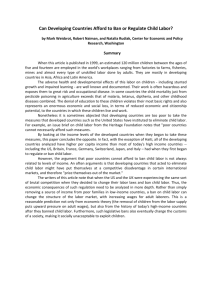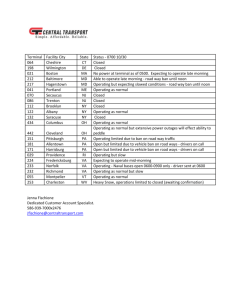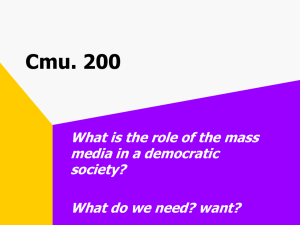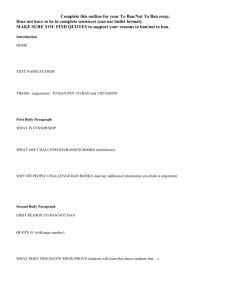Animal Defenders International v UK: sensible
advertisement
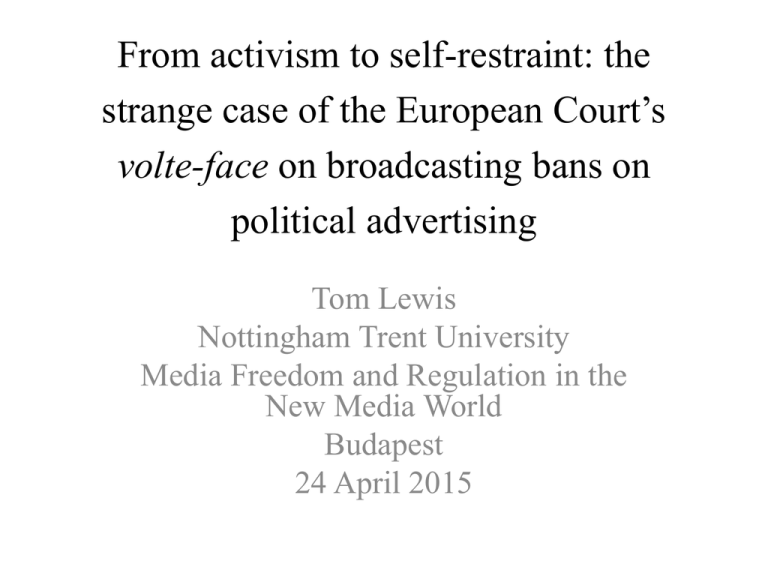
From activism to self-restraint: the strange case of the European Court’s volte-face on broadcasting bans on political advertising Tom Lewis Nottingham Trent University Media Freedom and Regulation in the New Media World Budapest 24 April 2015 Freedom of expression – the sine qua non of political democracy But sometimes freedom of expression itself can threaten democracy In particular it can threaten equality of opportunity in the democratic process – to tilt the playing field in favour of the wealthiest players … The power, and expense, of broadcasting The bogeyman – the USA The UK - The Communications Act 2003 section 321 When a democratically elected legislature passes a law restricting freedom of expression to protect the integrity of democracy itself, what should the approach of the court be to such a law? Activism? or Self-restraint? Animal Defenders International • My Mate’s a Primate Verein gegen Tierfabriken (VgT) v Switzerland (2002) Eat less meat: for the sake of the environment, the animals and your health! TV Vest AS and Rogaland Pensjonistparti v Norway (2009) Animal Defenders International v UK All parties agreed that some limitations on political ads were legitimate in order to protect democracy The real question was whether such a wide broadcasting ban, covering not just wealthy political actors, but also social advocacy groups posing no threat democracy, was a proportionate interference? By 9 votes to 8 the Grand Chamber found no violation of Article 10: the Communications Act ban is a proportionate restriction on freedom of political expression, in order to preserve the impartiality of broadcasters and protect the integrity of the democratic process (which corresponds to the ‘rights of others’ under Art 10(2)) ‘General Measures’ ‘In order to determine the proportionality of a general measure, the Court must primarily assess the legislative choices underlying it.’ Of particular importance was: • ‘the quality of the parliamentary and judicial review of the necessity of the measure’, and the ‘risk of abuse if the general measure were to be relaxed’, a question that was ‘primarily for the state to assess’. • Where a system of ‘case by case examination’ would ‘give rise to a risk of significant uncertainty’, then it was more likely that a general measure would be found to be a ‘more feasible means of achieving the legitimate aim’ [108] • ‘The more convincing the general justifications for the general measures are, the less importance the Court will attach to its impact in a particular case.’ [109] • Here there had been ‘exceptional examination’ and ‘exacting and pertinent reviews’ by both parliamentary and judicial bodies to which the Court attached ‘considerable weight’. [116] • Because of the ‘wealth of historical, cultural and political differences’ across Europe – ‘it is for each state to mould its own democratic vision’ thus widening the margin of appreciation [111] • AND – the ban only applied to paid TV & radio advertising – a host of other avenues remained open (ordinary TV shows, internet, print, posters, public protest); or ADI could be set up a charitable arm which would be exempt from the ban [122] Grand Chamber seems to be saying that an all encompassing ban that has a legitimate aim, but which catches within its broad sweep or fine mesh those who pose no threat to democracy, is likely to be found proportionate as long as there has been a proper debate by the legislature that introduced it… 1. Waters down proportionality Becomes a review of the quality of the debate at national level, rather than of the impact of the measure on the individual in the particular case. As long as a state ‘ticks the correct boxes’ in terms of debate, this will exempt it from the rigours of full proportionality review at any subsequent Strasbourg hearing 2. Which is it: ‘general measure’ or ‘blanket ban’ ? ‘General measure’ (Animal Defenders) ‘Blanket ban’ (Hirst v UK (No 2)) 3. Whither VgT and Pensioners Party ? Double Standards? In Switzerland, Norway (and Denmark) – it was NOT OKAY to ban political TV ads In United Kingdom – it was OKAY to ban political TV ads BUT WHY ? - just because of the quality of debate preceding the ban? (Judges Ziemele, Sajó et al ) 4. Freedom of expression ‘This is a ban which concerns the most protected form of expression (discussion on matters of public interest) by one of the most important categories of actors in the democratic process (an NGO) and a form of media which remains influential (radio and TV) without the least exception’ (Judge Tulkens et al, dissenting [13]; and Judge Ziemele et al, dissenting [2]) Is this a perfect example of sensible dialogue between national authorities and the Strasbourg Court? … or, post ‘prisoner voting’, did the Grand Chamber decide to think twice before again interfering in the mechanisms of British democracy?
